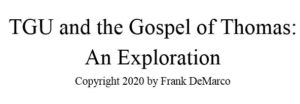
Saying 21
21 a Mary asked Jesus: Who are your disciples like? He replied: They are like little children in a field that does not belong to them. When the field’s owners come they will say: “Give our field back.” They will strip naked in the owners’ presence and give it back, returning their field to them.
21 b Therefore I say: If a householder knows a thief is coming, he will keep watch and not let him break into his house (of his kingdom) and steal his goods.
21 c You must keep watch against the world, preparing yourselves with power so that thieves will not find any way to come upon you.
21 d The situation you are expecting will come. Let a person who understands be with you.
21 e After the grain had ripened, he quickly came, carrying his sickle, and he harvested it.
21 f He who has ears to hear, let him hear.
21 a seems to say, we’re in 3D but we don’t belong to it, nor it to us. At some point we will have to return everything and go back to non-3D. And 21 b Starts with “therefore” but doesn’t seem obvious why b follows a. Guys?
Who is householder, who is thief, what is the house and what the goods that can be stolen? In context of 21 a.
I don’t know.
Remember the intent, to show them their place in the world of 3D/non-3D. And consider b in connection with 21 c.
Yes, it seems to equate them with the householder.
Well, in what way did he mean for them to “keep watch against the world”? And what power? And (d) “a person who understands.”
I suppose (looking back) what was to be protected against theft was the kingdom of heaven: the inner awareness; the state of being awake. And I can see that “a person who understands” would be of great value in meeting the challenge of the world that lulls to sleep.
And when the grain was ready, he harvested it at once, being ready.
Yes, I see that. Does it mean how they were to deal with others who woke up, or are they themselves the awakeners?
Does it have to be only one, not both?
Perhaps not.
And so a difficult passage is not, perhaps, so difficult. It does not require that every explanation be long.
Saying 22
22 a Jesus saw infants being suckled. He said to his disciples: Those infants taking milk are like those who enter the Kingdom.
22 b His disciples asked him: If we are infants will we enter the Kingdom. Jesus responded: When you make the two into one, and when you make the inside like the outside, and the outside like the inside, and the upper like the lower, and the lower like the upper, and thus make the male and the female the same, so that the male isn’t male, and the female isn’t female. When you can make an eye to replace an eye, and a hand to replace a hand, and a foot to replace a foot, and an image to replace an image, then you will enter the Kingdom.
So, guys, an interpretation? It seems obvious. Is there more than meets the eye?
That depends upon what meets your eye, of course.
Well, I’d say 22 a refers to a state of direct feed – nice pun, come to think of it. People who take direct nourishment in trust and acceptance, living in and from the non-3D connection. And 22 b means when you are all one thing, rather than divided between categories, and you have transcended duality and in a way replaced your old senses with new ones, then you may enter into the kingdom.
Good. But each of the images can be meditated upon, and will yield further insights. Still, you do have the basic idea of the saying. So, 23.
Galloping, these days, aren’t we?